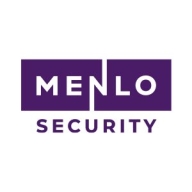


Forcepoint Next Generation Firewall and Menlo Secure are two competing products in the cybersecurity category. Based on user reviews, Forcepoint appears to have the upper hand in deployment and customer service, while Menlo Secure excels in its robust feature set.
Features: Forcepoint is recognized for its advanced network security capabilities, fine-grained policy controls, and effective traffic management. Menlo Secure stands out due to its effective isolation technology, comprehensive threat defense mechanisms, and innovative threat intelligence integration.
Room for Improvement: Users suggest that Forcepoint could enhance its reporting features, improve integration with third-party solutions, and expand its documentation. Menlo Secure could improve its administrative tools, ease the learning curve for new users, and provide more frequent updates to its UI.
Ease of Deployment and Customer Service: Forcepoint is noted for having a straightforward setup process and responsive customer support. Menlo Secure, while slightly more complex to deploy, offers solid customer service, though there are occasional reports of delayed responses. Forcepoint holds the edge in ease of deployment and customer service satisfaction.
Pricing and ROI: Users report that Forcepoint offers a competitive pricing structure and delivers strong ROI, especially for large-scale deployments. Menlo Secure, despite being perceived as more expensive, is seen as providing good value due to its unique features and robust security benefits. Menlo Secure is often considered worth the investment despite the higher cost.



Fortinet FortiGate offers comprehensive network security and firewall protection across multiple locations. It effectively manages data traffic and secures environments with features like VPN, intrusion prevention, and UTM controls.
Organizations rely on Fortinet FortiGate for its robust integration with advanced security policies, ensuring significant protection for enterprises, cloud environments, and educational sectors. It facilitates network segmentation, application-level security, and authentication management, securing communication within and between locations such as branches and data centers. Its efficient SD-WAN and UTM features enable streamlined data management and enhanced threat protection capabilities. Users appreciate its centralized management, facilitating seamless operations across diverse environments.
What are the key features of Fortinet FortiGate?
What benefits should users expect from Fortinet FortiGate?
Fortinet FortiGate is crucial in sectors like education, offering robust networks for secure data flow between campuses and facilitating remote learning. In enterprise environments, it allows efficient management of application traffic and security across multiple branches, while in the cloud, it seamlessly integrates with diverse platforms to enhance security infrastructure.
Forcepoint Next Generation Firewall is a versatile and comprehensive solution for perimeter security, offering features such as SD-WAN, IPS, VPN, and cloud or on-premises subscription keys. It is preferred by many clients over Cisco and is used for obligation redundancy, VPN access, and as the main point of security in infrastructure.
The product is praised for its simplicity, flexibility, complete feature set, scalability, and central management capabilities. Other valuable features include IPS, firewall, sandbox, application control, filtering, security management center, connectivity, and integration capabilities.
Menlo Security Secure Application Access
Menlo Security Secure Application Access makes zero trust access easy, giving users secure connectivity to private applications, including web and legacy applications. At the core of Secure Application Access is the Menlo Secure Cloud Browser, which fetches, secures and delivers the content for users.
In addition to providing simple-to-deploy, clientless ZTA, Secure Application Access and the Menlo Secure Cloud Browser protect applications from attacks such as session hijacking, cookie manipulation, and other tactics that employ protocol manipulation.
Secure Application Access protects applications from Internet threats and provides granular controls for added protection of the application and associated data. These security controls include Read-only/Read-write, Upload/download, Copy/paste, AV scanning, Sandboxing, and Data Loss Prevention.
Last Mile Data Protection
Menlo Last-Mile Data Protection identifies and prevents sensitive data from leaving your company by meticulously inspecting all file uploads and user input across browsing sessions. Leveraging the Secure Cloud Browser, users are protected from the internet and you can protect your organization from data loss with comprehensive traffic monitoring and controls. This approach addresses the growing concerns surrounding data leakage in the age of AI tools like ChatGPT.
By identifying sensitive data through file types, regular expressions, or predefined libraries, Menlo Last-Mile Data Protection empowers security teams to regulate data input into AI platforms and prevent unauthorized uploads. This capability provides crucial protection for intellectual property, PII, and other confidential information.
The solution leverages the Menlo Cloud Security Platform's visibility and control over traffic to reliably detect and prevent data leaks originating from both browser submission forms and non-browser traffic. With the ability to inspect encrypted web traffic, Menlo Last-Mile Data Protection enforces DLP policies consistently across all users and devices, ensuring comprehensive data protection.
We monitor all Firewalls reviews to prevent fraudulent reviews and keep review quality high. We do not post reviews by company employees or direct competitors. We validate each review for authenticity via cross-reference with LinkedIn, and personal follow-up with the reviewer when necessary.